SWN004 Reflective Essay: Communication and Engagement in Social Work
VerifiedAdded on 2023/06/11
|9
|2147
|207
Essay
AI Summary
This essay reflects on the author's understanding of social work communication, emphasizing strength-based and anti-oppressive practices. It details experiences as a tutorial group member and participant in role-plays, highlighting communication strengths like listening skills and patience, as well as weaknesses such as lack of confidence and difficulty asking leading questions. Strategies for improvement, including critical reflection, supervision, and self-care, are discussed. The essay concludes that reflection is essential for enhancing communication skills and that active learning through group work and role-plays improves comprehension, ultimately advocating for continuous skill development in social work practice. The document is contributed by a student and available on Desklib, a platform offering study tools for students.
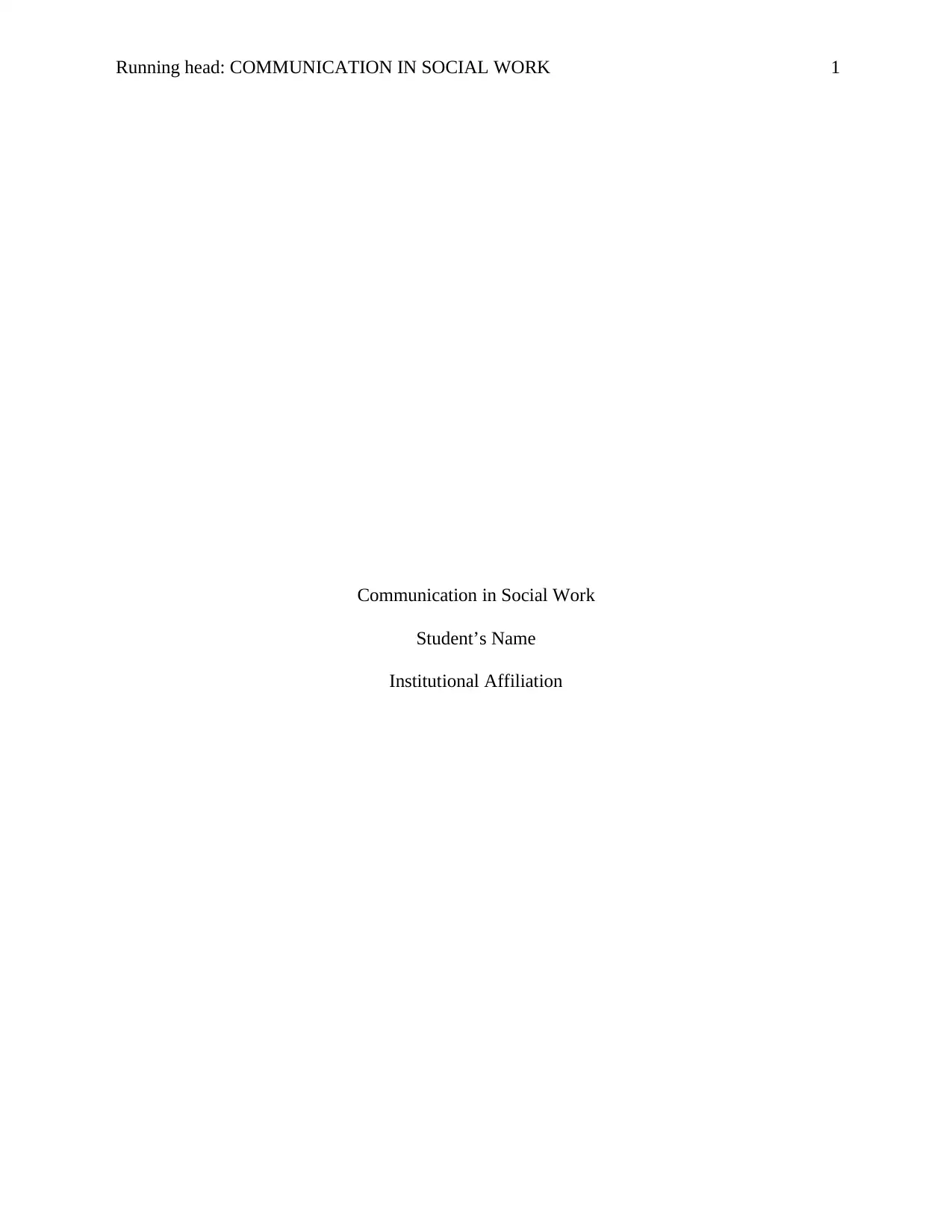
Running head: COMMUNICATION IN SOCIAL WORK 1
Communication in Social Work
Student’s Name
Institutional Affiliation
Communication in Social Work
Student’s Name
Institutional Affiliation
Paraphrase This Document
Need a fresh take? Get an instant paraphrase of this document with our AI Paraphraser
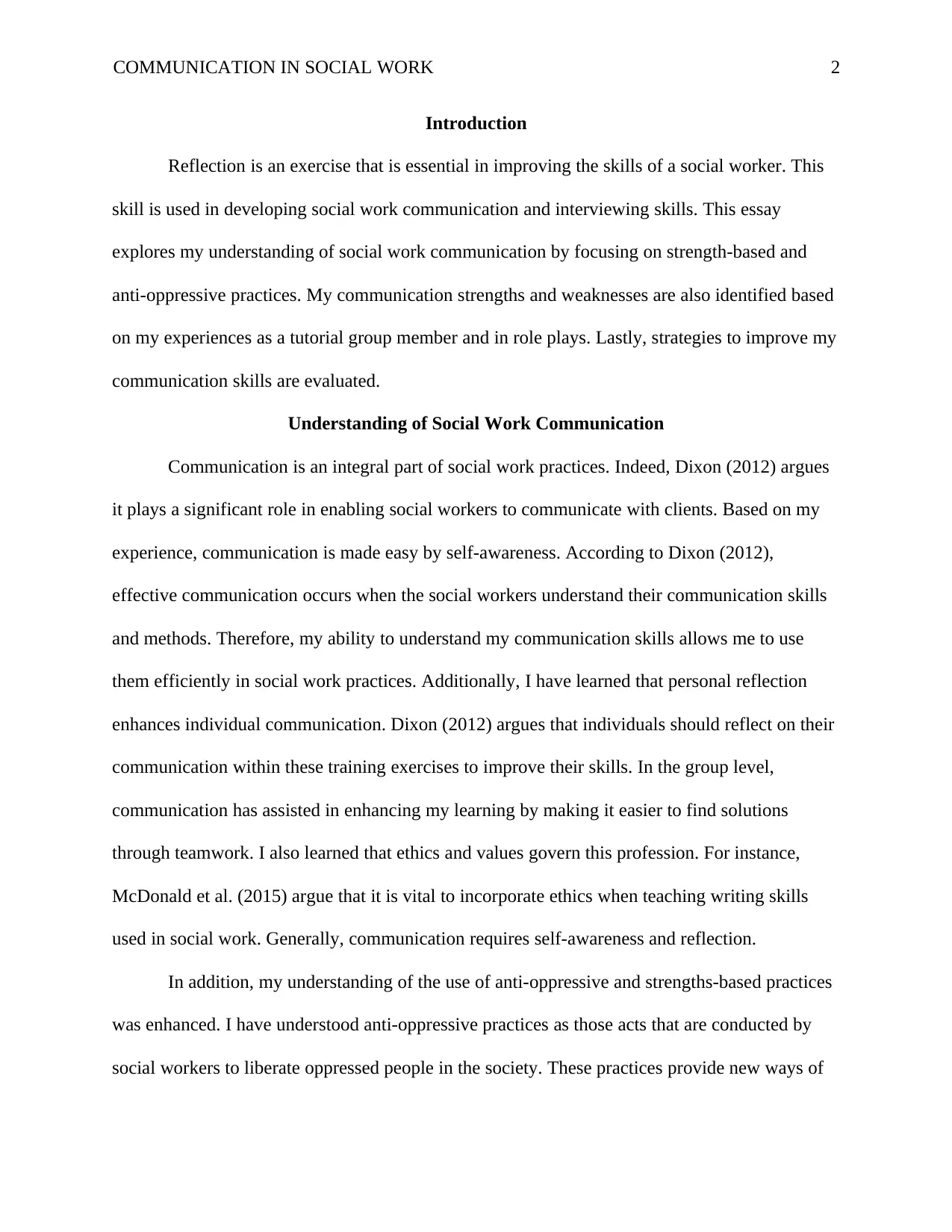
COMMUNICATION IN SOCIAL WORK 2
Introduction
Reflection is an exercise that is essential in improving the skills of a social worker. This
skill is used in developing social work communication and interviewing skills. This essay
explores my understanding of social work communication by focusing on strength-based and
anti-oppressive practices. My communication strengths and weaknesses are also identified based
on my experiences as a tutorial group member and in role plays. Lastly, strategies to improve my
communication skills are evaluated.
Understanding of Social Work Communication
Communication is an integral part of social work practices. Indeed, Dixon (2012) argues
it plays a significant role in enabling social workers to communicate with clients. Based on my
experience, communication is made easy by self-awareness. According to Dixon (2012),
effective communication occurs when the social workers understand their communication skills
and methods. Therefore, my ability to understand my communication skills allows me to use
them efficiently in social work practices. Additionally, I have learned that personal reflection
enhances individual communication. Dixon (2012) argues that individuals should reflect on their
communication within these training exercises to improve their skills. In the group level,
communication has assisted in enhancing my learning by making it easier to find solutions
through teamwork. I also learned that ethics and values govern this profession. For instance,
McDonald et al. (2015) argue that it is vital to incorporate ethics when teaching writing skills
used in social work. Generally, communication requires self-awareness and reflection.
In addition, my understanding of the use of anti-oppressive and strengths-based practices
was enhanced. I have understood anti-oppressive practices as those acts that are conducted by
social workers to liberate oppressed people in the society. These practices provide new ways of
Introduction
Reflection is an exercise that is essential in improving the skills of a social worker. This
skill is used in developing social work communication and interviewing skills. This essay
explores my understanding of social work communication by focusing on strength-based and
anti-oppressive practices. My communication strengths and weaknesses are also identified based
on my experiences as a tutorial group member and in role plays. Lastly, strategies to improve my
communication skills are evaluated.
Understanding of Social Work Communication
Communication is an integral part of social work practices. Indeed, Dixon (2012) argues
it plays a significant role in enabling social workers to communicate with clients. Based on my
experience, communication is made easy by self-awareness. According to Dixon (2012),
effective communication occurs when the social workers understand their communication skills
and methods. Therefore, my ability to understand my communication skills allows me to use
them efficiently in social work practices. Additionally, I have learned that personal reflection
enhances individual communication. Dixon (2012) argues that individuals should reflect on their
communication within these training exercises to improve their skills. In the group level,
communication has assisted in enhancing my learning by making it easier to find solutions
through teamwork. I also learned that ethics and values govern this profession. For instance,
McDonald et al. (2015) argue that it is vital to incorporate ethics when teaching writing skills
used in social work. Generally, communication requires self-awareness and reflection.
In addition, my understanding of the use of anti-oppressive and strengths-based practices
was enhanced. I have understood anti-oppressive practices as those acts that are conducted by
social workers to liberate oppressed people in the society. These practices provide new ways of
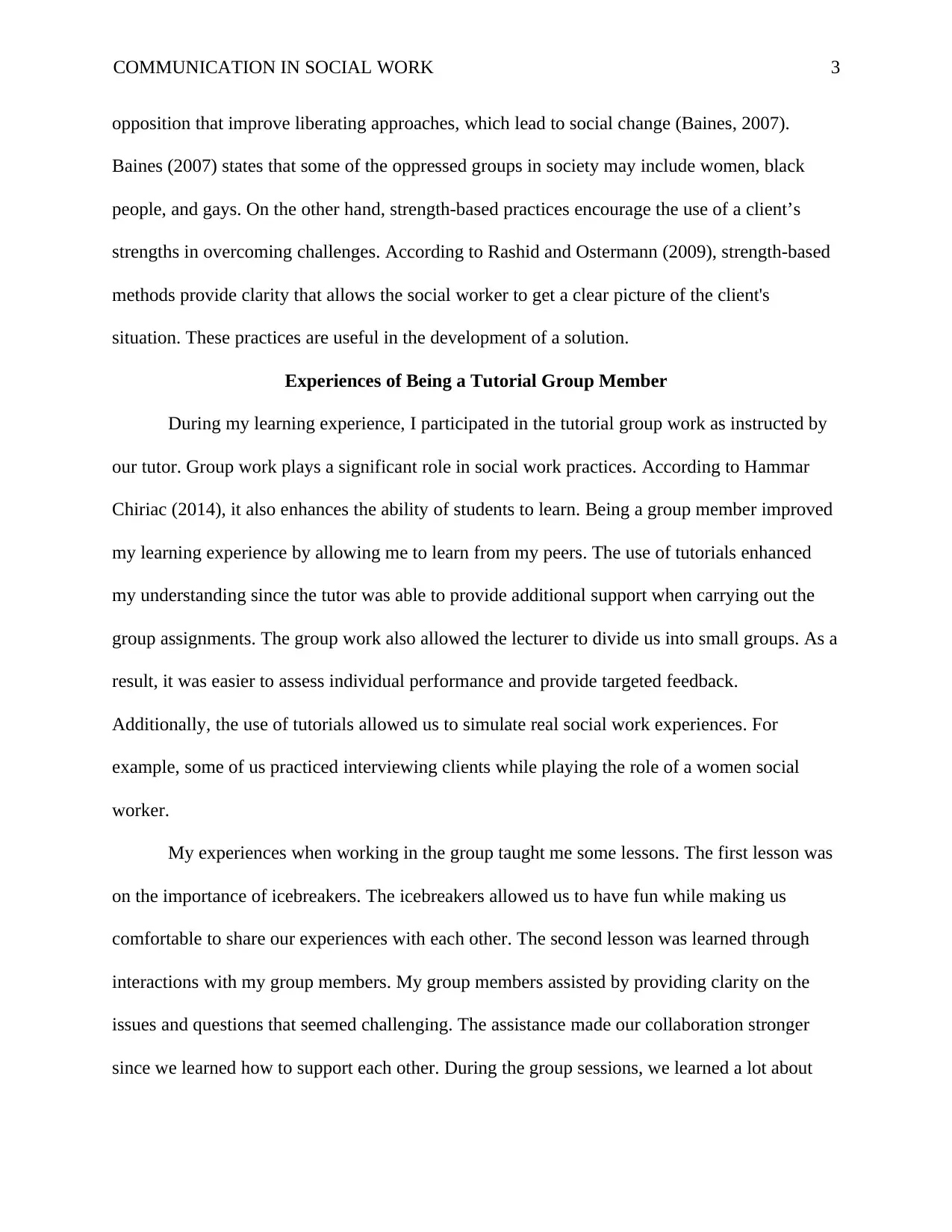
COMMUNICATION IN SOCIAL WORK 3
opposition that improve liberating approaches, which lead to social change (Baines, 2007).
Baines (2007) states that some of the oppressed groups in society may include women, black
people, and gays. On the other hand, strength-based practices encourage the use of a client’s
strengths in overcoming challenges. According to Rashid and Ostermann (2009), strength-based
methods provide clarity that allows the social worker to get a clear picture of the client's
situation. These practices are useful in the development of a solution.
Experiences of Being a Tutorial Group Member
During my learning experience, I participated in the tutorial group work as instructed by
our tutor. Group work plays a significant role in social work practices. According to Hammar
Chiriac (2014), it also enhances the ability of students to learn. Being a group member improved
my learning experience by allowing me to learn from my peers. The use of tutorials enhanced
my understanding since the tutor was able to provide additional support when carrying out the
group assignments. The group work also allowed the lecturer to divide us into small groups. As a
result, it was easier to assess individual performance and provide targeted feedback.
Additionally, the use of tutorials allowed us to simulate real social work experiences. For
example, some of us practiced interviewing clients while playing the role of a women social
worker.
My experiences when working in the group taught me some lessons. The first lesson was
on the importance of icebreakers. The icebreakers allowed us to have fun while making us
comfortable to share our experiences with each other. The second lesson was learned through
interactions with my group members. My group members assisted by providing clarity on the
issues and questions that seemed challenging. The assistance made our collaboration stronger
since we learned how to support each other. During the group sessions, we learned a lot about
opposition that improve liberating approaches, which lead to social change (Baines, 2007).
Baines (2007) states that some of the oppressed groups in society may include women, black
people, and gays. On the other hand, strength-based practices encourage the use of a client’s
strengths in overcoming challenges. According to Rashid and Ostermann (2009), strength-based
methods provide clarity that allows the social worker to get a clear picture of the client's
situation. These practices are useful in the development of a solution.
Experiences of Being a Tutorial Group Member
During my learning experience, I participated in the tutorial group work as instructed by
our tutor. Group work plays a significant role in social work practices. According to Hammar
Chiriac (2014), it also enhances the ability of students to learn. Being a group member improved
my learning experience by allowing me to learn from my peers. The use of tutorials enhanced
my understanding since the tutor was able to provide additional support when carrying out the
group assignments. The group work also allowed the lecturer to divide us into small groups. As a
result, it was easier to assess individual performance and provide targeted feedback.
Additionally, the use of tutorials allowed us to simulate real social work experiences. For
example, some of us practiced interviewing clients while playing the role of a women social
worker.
My experiences when working in the group taught me some lessons. The first lesson was
on the importance of icebreakers. The icebreakers allowed us to have fun while making us
comfortable to share our experiences with each other. The second lesson was learned through
interactions with my group members. My group members assisted by providing clarity on the
issues and questions that seemed challenging. The assistance made our collaboration stronger
since we learned how to support each other. During the group sessions, we learned a lot about
⊘ This is a preview!⊘
Do you want full access?
Subscribe today to unlock all pages.

Trusted by 1+ million students worldwide
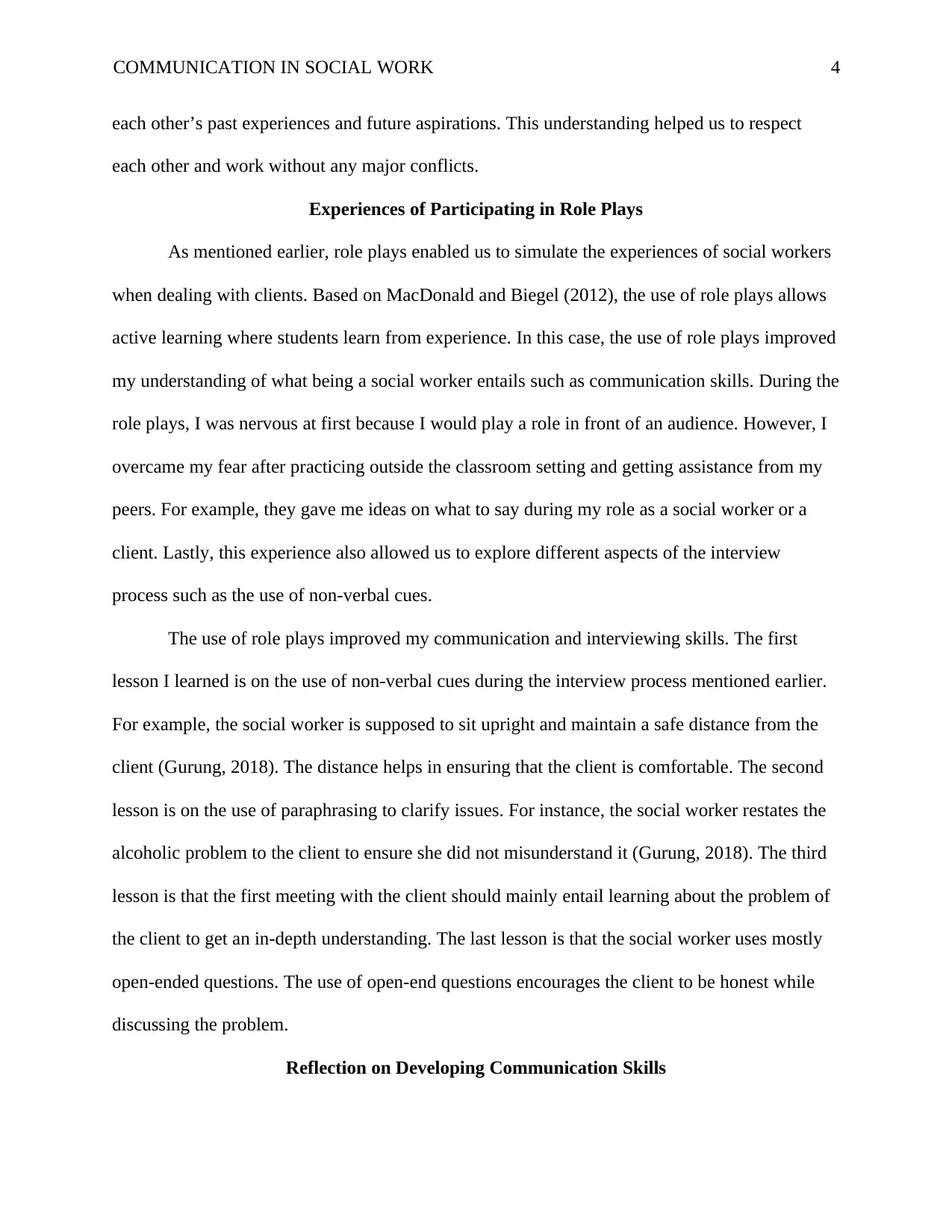
COMMUNICATION IN SOCIAL WORK 4
each other’s past experiences and future aspirations. This understanding helped us to respect
each other and work without any major conflicts.
Experiences of Participating in Role Plays
As mentioned earlier, role plays enabled us to simulate the experiences of social workers
when dealing with clients. Based on MacDonald and Biegel (2012), the use of role plays allows
active learning where students learn from experience. In this case, the use of role plays improved
my understanding of what being a social worker entails such as communication skills. During the
role plays, I was nervous at first because I would play a role in front of an audience. However, I
overcame my fear after practicing outside the classroom setting and getting assistance from my
peers. For example, they gave me ideas on what to say during my role as a social worker or a
client. Lastly, this experience also allowed us to explore different aspects of the interview
process such as the use of non-verbal cues.
The use of role plays improved my communication and interviewing skills. The first
lesson I learned is on the use of non-verbal cues during the interview process mentioned earlier.
For example, the social worker is supposed to sit upright and maintain a safe distance from the
client (Gurung, 2018). The distance helps in ensuring that the client is comfortable. The second
lesson is on the use of paraphrasing to clarify issues. For instance, the social worker restates the
alcoholic problem to the client to ensure she did not misunderstand it (Gurung, 2018). The third
lesson is that the first meeting with the client should mainly entail learning about the problem of
the client to get an in-depth understanding. The last lesson is that the social worker uses mostly
open-ended questions. The use of open-end questions encourages the client to be honest while
discussing the problem.
Reflection on Developing Communication Skills
each other’s past experiences and future aspirations. This understanding helped us to respect
each other and work without any major conflicts.
Experiences of Participating in Role Plays
As mentioned earlier, role plays enabled us to simulate the experiences of social workers
when dealing with clients. Based on MacDonald and Biegel (2012), the use of role plays allows
active learning where students learn from experience. In this case, the use of role plays improved
my understanding of what being a social worker entails such as communication skills. During the
role plays, I was nervous at first because I would play a role in front of an audience. However, I
overcame my fear after practicing outside the classroom setting and getting assistance from my
peers. For example, they gave me ideas on what to say during my role as a social worker or a
client. Lastly, this experience also allowed us to explore different aspects of the interview
process such as the use of non-verbal cues.
The use of role plays improved my communication and interviewing skills. The first
lesson I learned is on the use of non-verbal cues during the interview process mentioned earlier.
For example, the social worker is supposed to sit upright and maintain a safe distance from the
client (Gurung, 2018). The distance helps in ensuring that the client is comfortable. The second
lesson is on the use of paraphrasing to clarify issues. For instance, the social worker restates the
alcoholic problem to the client to ensure she did not misunderstand it (Gurung, 2018). The third
lesson is that the first meeting with the client should mainly entail learning about the problem of
the client to get an in-depth understanding. The last lesson is that the social worker uses mostly
open-ended questions. The use of open-end questions encourages the client to be honest while
discussing the problem.
Reflection on Developing Communication Skills
Paraphrase This Document
Need a fresh take? Get an instant paraphrase of this document with our AI Paraphraser
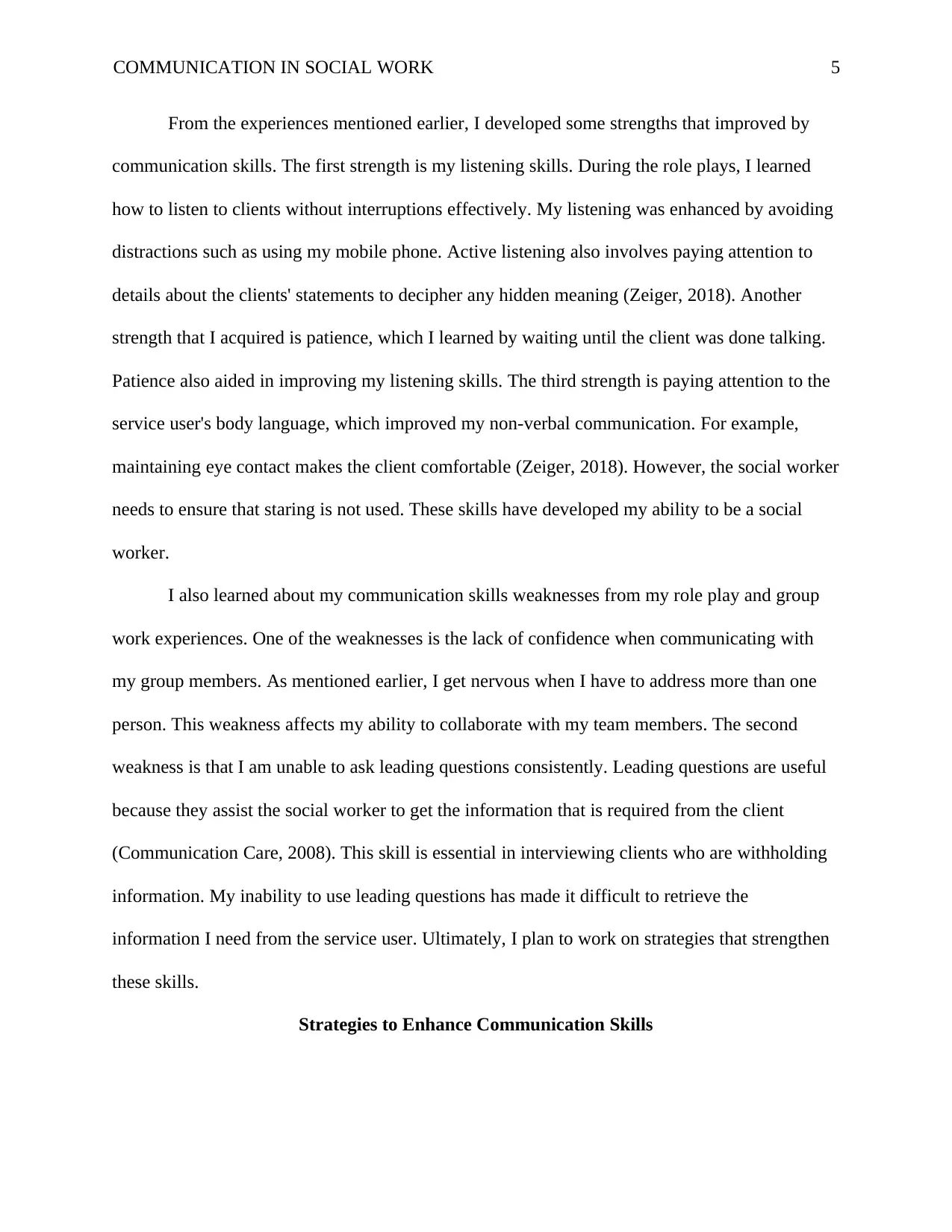
COMMUNICATION IN SOCIAL WORK 5
From the experiences mentioned earlier, I developed some strengths that improved by
communication skills. The first strength is my listening skills. During the role plays, I learned
how to listen to clients without interruptions effectively. My listening was enhanced by avoiding
distractions such as using my mobile phone. Active listening also involves paying attention to
details about the clients' statements to decipher any hidden meaning (Zeiger, 2018). Another
strength that I acquired is patience, which I learned by waiting until the client was done talking.
Patience also aided in improving my listening skills. The third strength is paying attention to the
service user's body language, which improved my non-verbal communication. For example,
maintaining eye contact makes the client comfortable (Zeiger, 2018). However, the social worker
needs to ensure that staring is not used. These skills have developed my ability to be a social
worker.
I also learned about my communication skills weaknesses from my role play and group
work experiences. One of the weaknesses is the lack of confidence when communicating with
my group members. As mentioned earlier, I get nervous when I have to address more than one
person. This weakness affects my ability to collaborate with my team members. The second
weakness is that I am unable to ask leading questions consistently. Leading questions are useful
because they assist the social worker to get the information that is required from the client
(Communication Care, 2008). This skill is essential in interviewing clients who are withholding
information. My inability to use leading questions has made it difficult to retrieve the
information I need from the service user. Ultimately, I plan to work on strategies that strengthen
these skills.
Strategies to Enhance Communication Skills
From the experiences mentioned earlier, I developed some strengths that improved by
communication skills. The first strength is my listening skills. During the role plays, I learned
how to listen to clients without interruptions effectively. My listening was enhanced by avoiding
distractions such as using my mobile phone. Active listening also involves paying attention to
details about the clients' statements to decipher any hidden meaning (Zeiger, 2018). Another
strength that I acquired is patience, which I learned by waiting until the client was done talking.
Patience also aided in improving my listening skills. The third strength is paying attention to the
service user's body language, which improved my non-verbal communication. For example,
maintaining eye contact makes the client comfortable (Zeiger, 2018). However, the social worker
needs to ensure that staring is not used. These skills have developed my ability to be a social
worker.
I also learned about my communication skills weaknesses from my role play and group
work experiences. One of the weaknesses is the lack of confidence when communicating with
my group members. As mentioned earlier, I get nervous when I have to address more than one
person. This weakness affects my ability to collaborate with my team members. The second
weakness is that I am unable to ask leading questions consistently. Leading questions are useful
because they assist the social worker to get the information that is required from the client
(Communication Care, 2008). This skill is essential in interviewing clients who are withholding
information. My inability to use leading questions has made it difficult to retrieve the
information I need from the service user. Ultimately, I plan to work on strategies that strengthen
these skills.
Strategies to Enhance Communication Skills
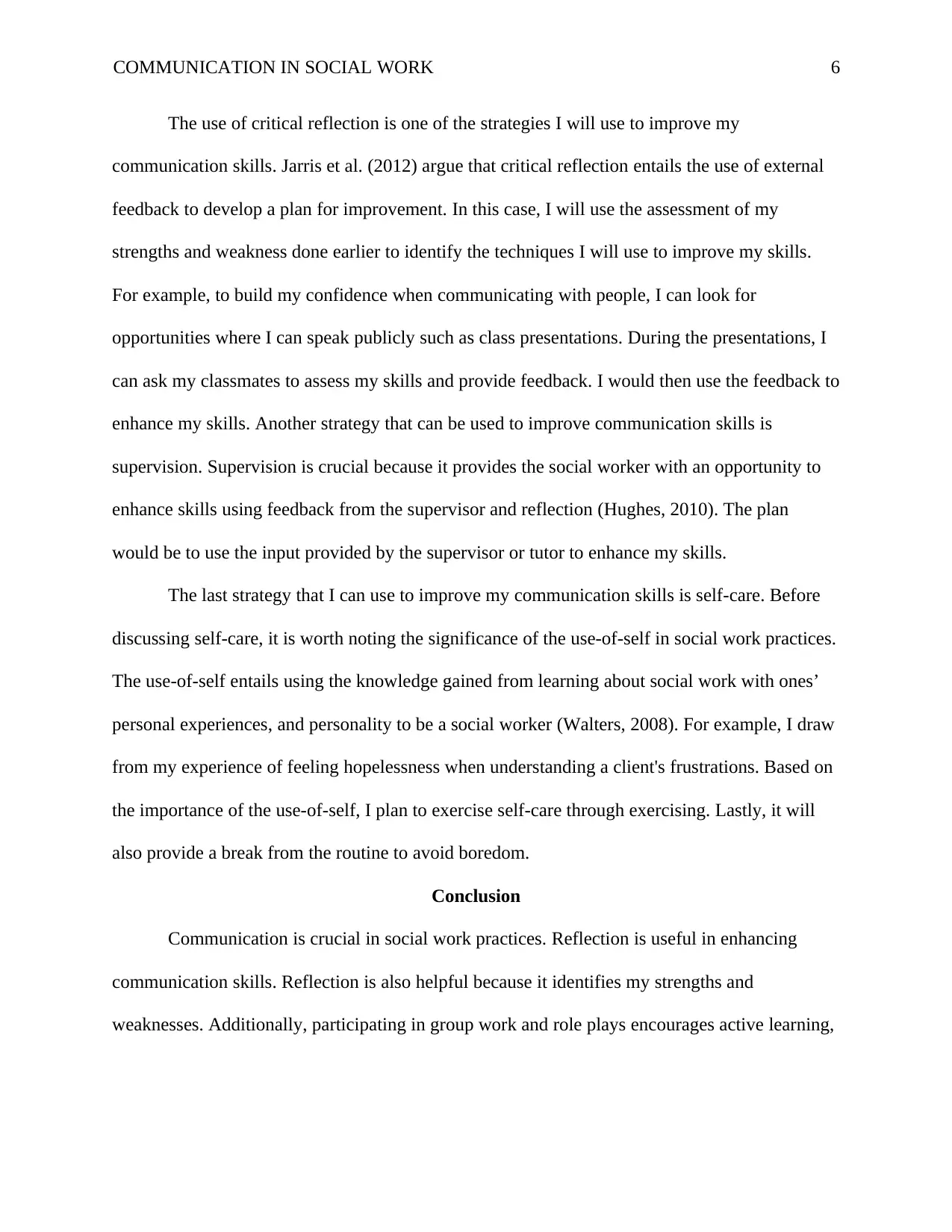
COMMUNICATION IN SOCIAL WORK 6
The use of critical reflection is one of the strategies I will use to improve my
communication skills. Jarris et al. (2012) argue that critical reflection entails the use of external
feedback to develop a plan for improvement. In this case, I will use the assessment of my
strengths and weakness done earlier to identify the techniques I will use to improve my skills.
For example, to build my confidence when communicating with people, I can look for
opportunities where I can speak publicly such as class presentations. During the presentations, I
can ask my classmates to assess my skills and provide feedback. I would then use the feedback to
enhance my skills. Another strategy that can be used to improve communication skills is
supervision. Supervision is crucial because it provides the social worker with an opportunity to
enhance skills using feedback from the supervisor and reflection (Hughes, 2010). The plan
would be to use the input provided by the supervisor or tutor to enhance my skills.
The last strategy that I can use to improve my communication skills is self-care. Before
discussing self-care, it is worth noting the significance of the use-of-self in social work practices.
The use-of-self entails using the knowledge gained from learning about social work with ones’
personal experiences, and personality to be a social worker (Walters, 2008). For example, I draw
from my experience of feeling hopelessness when understanding a client's frustrations. Based on
the importance of the use-of-self, I plan to exercise self-care through exercising. Lastly, it will
also provide a break from the routine to avoid boredom.
Conclusion
Communication is crucial in social work practices. Reflection is useful in enhancing
communication skills. Reflection is also helpful because it identifies my strengths and
weaknesses. Additionally, participating in group work and role plays encourages active learning,
The use of critical reflection is one of the strategies I will use to improve my
communication skills. Jarris et al. (2012) argue that critical reflection entails the use of external
feedback to develop a plan for improvement. In this case, I will use the assessment of my
strengths and weakness done earlier to identify the techniques I will use to improve my skills.
For example, to build my confidence when communicating with people, I can look for
opportunities where I can speak publicly such as class presentations. During the presentations, I
can ask my classmates to assess my skills and provide feedback. I would then use the feedback to
enhance my skills. Another strategy that can be used to improve communication skills is
supervision. Supervision is crucial because it provides the social worker with an opportunity to
enhance skills using feedback from the supervisor and reflection (Hughes, 2010). The plan
would be to use the input provided by the supervisor or tutor to enhance my skills.
The last strategy that I can use to improve my communication skills is self-care. Before
discussing self-care, it is worth noting the significance of the use-of-self in social work practices.
The use-of-self entails using the knowledge gained from learning about social work with ones’
personal experiences, and personality to be a social worker (Walters, 2008). For example, I draw
from my experience of feeling hopelessness when understanding a client's frustrations. Based on
the importance of the use-of-self, I plan to exercise self-care through exercising. Lastly, it will
also provide a break from the routine to avoid boredom.
Conclusion
Communication is crucial in social work practices. Reflection is useful in enhancing
communication skills. Reflection is also helpful because it identifies my strengths and
weaknesses. Additionally, participating in group work and role plays encourages active learning,
⊘ This is a preview!⊘
Do you want full access?
Subscribe today to unlock all pages.

Trusted by 1+ million students worldwide
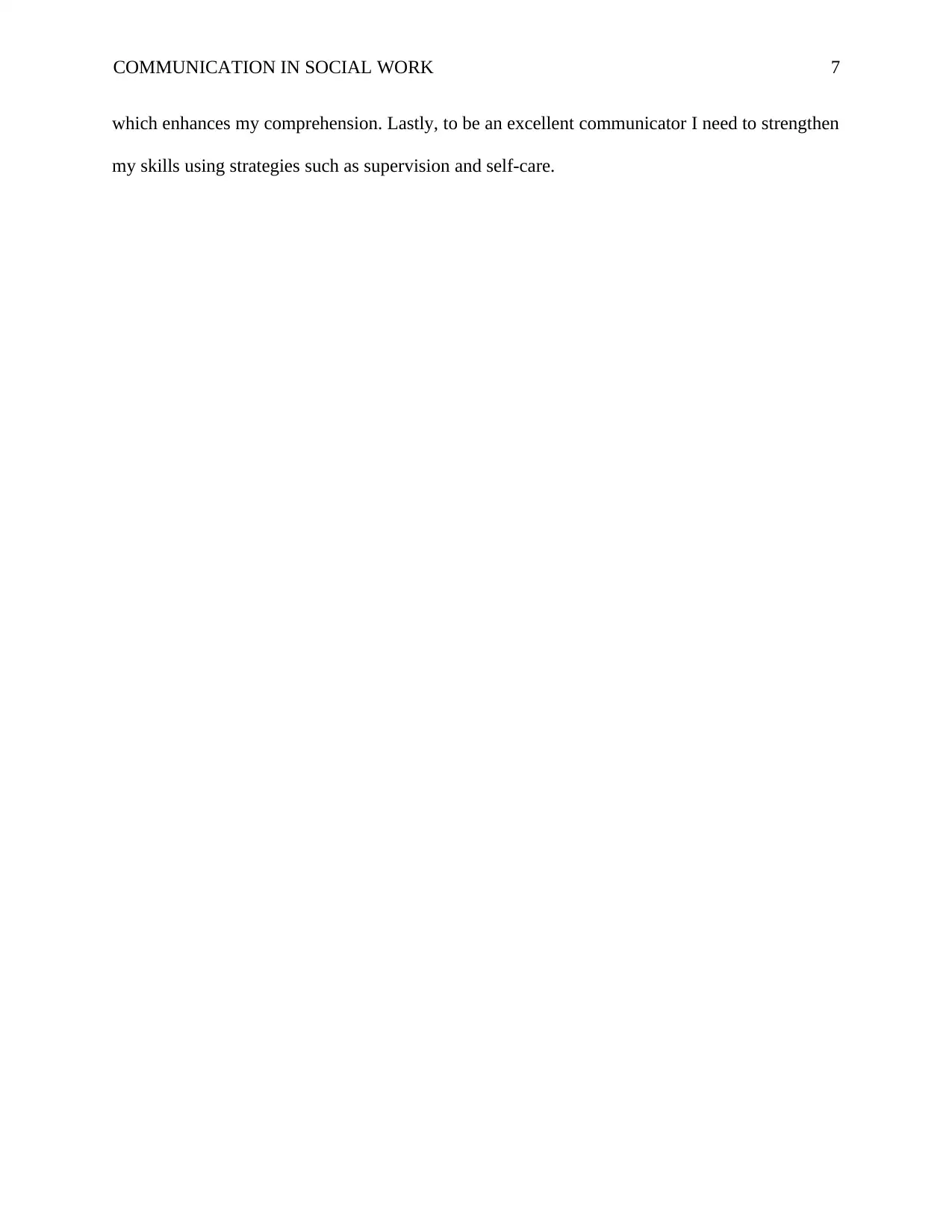
COMMUNICATION IN SOCIAL WORK 7
which enhances my comprehension. Lastly, to be an excellent communicator I need to strengthen
my skills using strategies such as supervision and self-care.
which enhances my comprehension. Lastly, to be an excellent communicator I need to strengthen
my skills using strategies such as supervision and self-care.
Paraphrase This Document
Need a fresh take? Get an instant paraphrase of this document with our AI Paraphraser
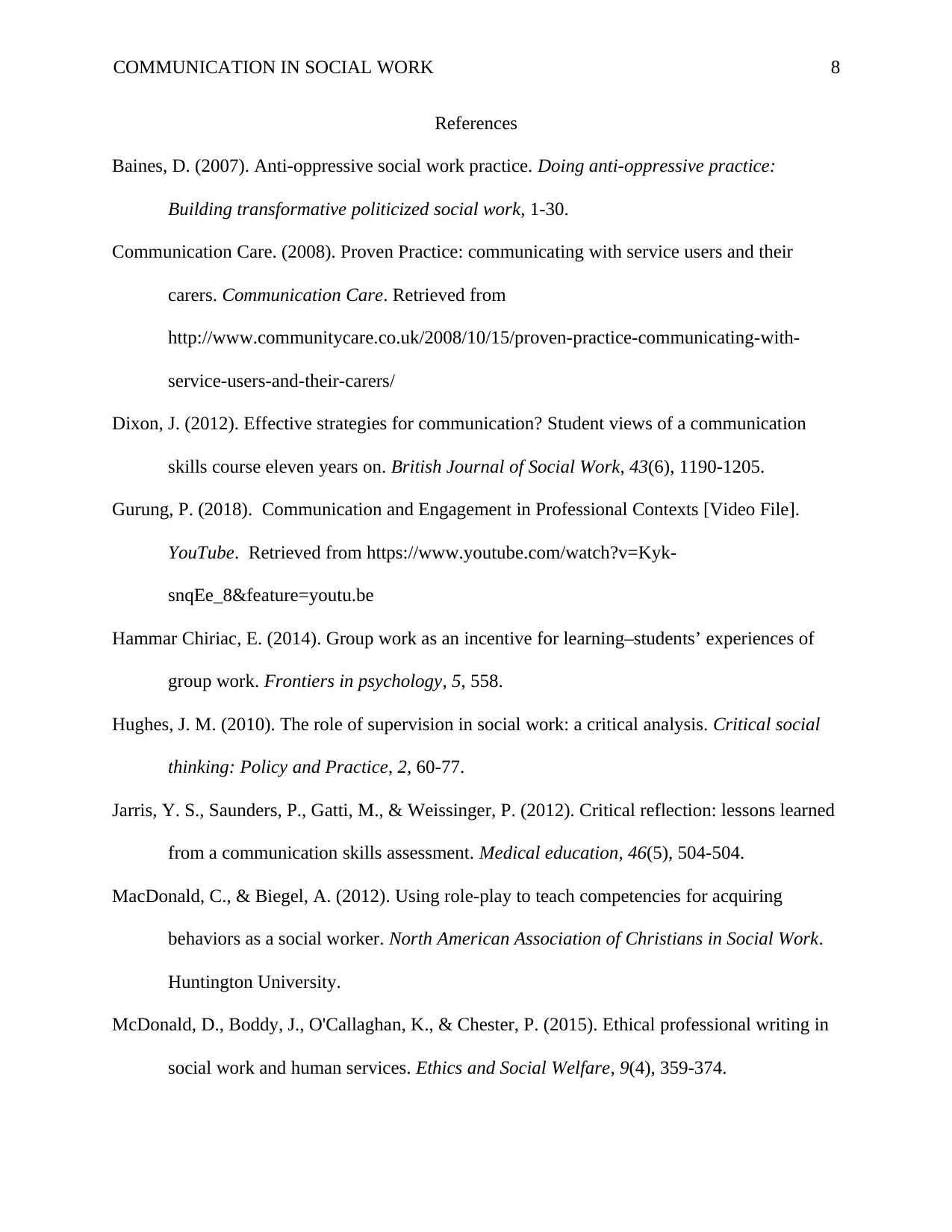
COMMUNICATION IN SOCIAL WORK 8
References
Baines, D. (2007). Anti-oppressive social work practice. Doing anti-oppressive practice:
Building transformative politicized social work, 1-30.
Communication Care. (2008). Proven Practice: communicating with service users and their
carers. Communication Care. Retrieved from
http://www.communitycare.co.uk/2008/10/15/proven-practice-communicating-with-
service-users-and-their-carers/
Dixon, J. (2012). Effective strategies for communication? Student views of a communication
skills course eleven years on. British Journal of Social Work, 43(6), 1190-1205.
Gurung, P. (2018). Communication and Engagement in Professional Contexts [Video File].
YouTube. Retrieved from https://www.youtube.com/watch?v=Kyk-
snqEe_8&feature=youtu.be
Hammar Chiriac, E. (2014). Group work as an incentive for learning–students’ experiences of
group work. Frontiers in psychology, 5, 558.
Hughes, J. M. (2010). The role of supervision in social work: a critical analysis. Critical social
thinking: Policy and Practice, 2, 60-77.
Jarris, Y. S., Saunders, P., Gatti, M., & Weissinger, P. (2012). Critical reflection: lessons learned
from a communication skills assessment. Medical education, 46(5), 504-504.
MacDonald, C., & Biegel, A. (2012). Using role-play to teach competencies for acquiring
behaviors as a social worker. North American Association of Christians in Social Work.
Huntington University.
McDonald, D., Boddy, J., O'Callaghan, K., & Chester, P. (2015). Ethical professional writing in
social work and human services. Ethics and Social Welfare, 9(4), 359-374.
References
Baines, D. (2007). Anti-oppressive social work practice. Doing anti-oppressive practice:
Building transformative politicized social work, 1-30.
Communication Care. (2008). Proven Practice: communicating with service users and their
carers. Communication Care. Retrieved from
http://www.communitycare.co.uk/2008/10/15/proven-practice-communicating-with-
service-users-and-their-carers/
Dixon, J. (2012). Effective strategies for communication? Student views of a communication
skills course eleven years on. British Journal of Social Work, 43(6), 1190-1205.
Gurung, P. (2018). Communication and Engagement in Professional Contexts [Video File].
YouTube. Retrieved from https://www.youtube.com/watch?v=Kyk-
snqEe_8&feature=youtu.be
Hammar Chiriac, E. (2014). Group work as an incentive for learning–students’ experiences of
group work. Frontiers in psychology, 5, 558.
Hughes, J. M. (2010). The role of supervision in social work: a critical analysis. Critical social
thinking: Policy and Practice, 2, 60-77.
Jarris, Y. S., Saunders, P., Gatti, M., & Weissinger, P. (2012). Critical reflection: lessons learned
from a communication skills assessment. Medical education, 46(5), 504-504.
MacDonald, C., & Biegel, A. (2012). Using role-play to teach competencies for acquiring
behaviors as a social worker. North American Association of Christians in Social Work.
Huntington University.
McDonald, D., Boddy, J., O'Callaghan, K., & Chester, P. (2015). Ethical professional writing in
social work and human services. Ethics and Social Welfare, 9(4), 359-374.
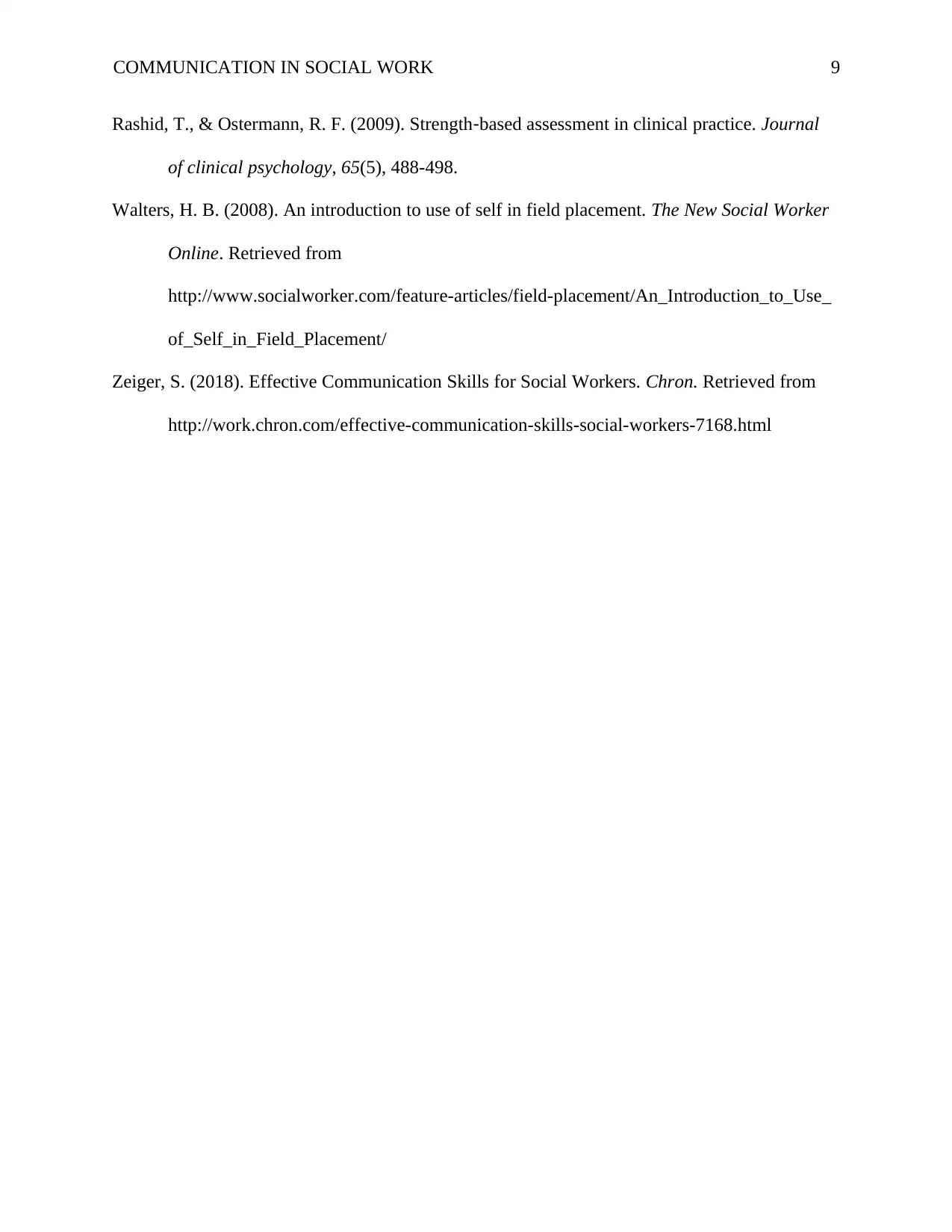
COMMUNICATION IN SOCIAL WORK 9
Rashid, T., & Ostermann, R. F. (2009). Strength‐based assessment in clinical practice. Journal
of clinical psychology, 65(5), 488-498.
Walters, H. B. (2008). An introduction to use of self in field placement. The New Social Worker
Online. Retrieved from
http://www.socialworker.com/feature-articles/field-placement/An_Introduction_to_Use_
of_Self_in_Field_Placement/
Zeiger, S. (2018). Effective Communication Skills for Social Workers. Chron. Retrieved from
http://work.chron.com/effective-communication-skills-social-workers-7168.html
Rashid, T., & Ostermann, R. F. (2009). Strength‐based assessment in clinical practice. Journal
of clinical psychology, 65(5), 488-498.
Walters, H. B. (2008). An introduction to use of self in field placement. The New Social Worker
Online. Retrieved from
http://www.socialworker.com/feature-articles/field-placement/An_Introduction_to_Use_
of_Self_in_Field_Placement/
Zeiger, S. (2018). Effective Communication Skills for Social Workers. Chron. Retrieved from
http://work.chron.com/effective-communication-skills-social-workers-7168.html
⊘ This is a preview!⊘
Do you want full access?
Subscribe today to unlock all pages.

Trusted by 1+ million students worldwide
1 out of 9
Related Documents
Your All-in-One AI-Powered Toolkit for Academic Success.
+13062052269
info@desklib.com
Available 24*7 on WhatsApp / Email
![[object Object]](/_next/static/media/star-bottom.7253800d.svg)
Unlock your academic potential
Copyright © 2020–2026 A2Z Services. All Rights Reserved. Developed and managed by ZUCOL.





